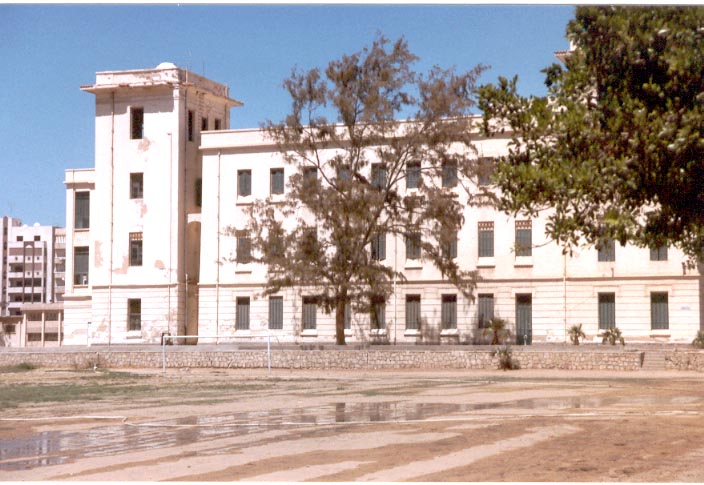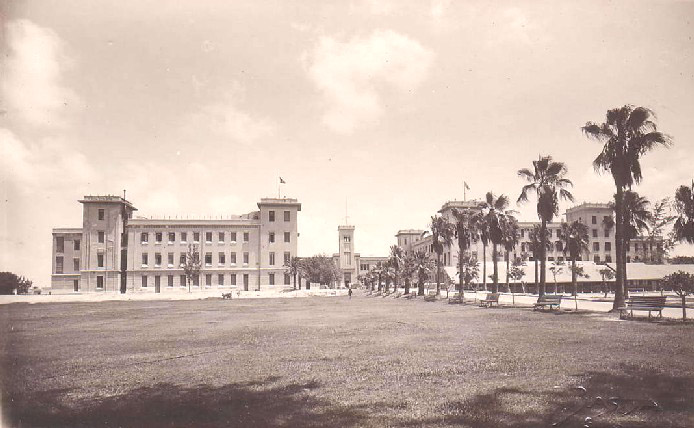
AAHA = Amicale Alexandrie Hier et Aujourd'hui : www.aaha.ch
PHOTOS FROM ALEXANDRIA
Victoria College

(photos taken in May 1997)


(Photo taken around 1950)
web site : http://egy.com/victoria/96-03-30.shtml
AAHA = Amicale Alexandrie Hier et Aujourd'hui : www.aaha.ch
 |
31 Oct. - 6 Nov. 2002 |
||
Egypt's Eton recalled
One school. One city. And one hundred years of rich history between them. Fatemah Farag traces the ups and downs of Victoria College
On 1 November 1902, Victoria College (VC) opened its doors to 25 boys. Among them was only one British boy, who came from Tanta. It was a modest beginning to what was to become one of the region's most prestigious schools, counting among its graduates the late King Hussein of Jordan, King Simon of Bulgaria, Prince Abdullah of Iraq, renowned scholar and writer Edward Said, actor Omar Sherif, film directors Youssef Chahine and Shady Abdel-Salam.
In short, VC became the educational institution of choice of the Arab elite. In Victoria College: A History Revealed (edited by Sahar Hamouda and Colin Clement and published by the American University in Cairo Press last week) VC former teacher Douglas Haydon remembers his 20 years at the school that was:
"When I arrived at Victoria in the winter of 1928-29, one of the first people I met was the head boy, Sirak Heroui, a son of the Abyssinian [Ethiopian] foreign minister. With him in the Sixth Form were a Moslem Syrian, whose father had once been prime minister of a land under French mandate, and an Egyptian Jew," Haydon wrote. "These two were [later] to become joint Head Boys of a school where Egyptian Moslems were the largest single group. The arrangement worked well and the fact in itself illustrates the harm that has been done by Middle East developments outside Egypt in the last forty years. At that time and during the early thirties, parents sent their sons to us from places as distant as Kenya, Zanzibar, the Seychelles, Singapore and even Brunei."
Four years after the school opened its doors and at precisely 4:30pm on 24 May, hundreds of distinguished guests celebrated the official inauguration of the new buildings of VC. The guest of honour was Lord Cromer, British agent and consul-general of Egypt between 1900 and 1907, and Lady Cromer, who laid the foundations for the new buildings.
In his address at the event Lord Cromer said, "We are assembled here today, on the anniversary of the birthday of our late revered Queen, to lay the foundation stone of a larger and more complete institution than that which formerly existed... [The school] will, I trust, help in some degree towards the political and social fusion of the various nations who inhabit the valley of the Nile, and who, although they are not all Egyptians in the ordinary and technical sense, in that they are all dwellers in Egypt, and all equally interested in the welfare of the country."
At the time Cromer spoke, of the pupils enrolled 90 were Christians, 67 Jews and 39 Muslims. The national and ethnic groups represented were Egyptian, Turkish, Syrian, Armenian, Maltese, Greek, English, French, Italian, Spanish, Dutch, Swiss and Belgian.
The cosmopolitan nature of the school mirrored that of the city around it. After the digging of the Mahmoudiya Canal in 1819, Alexandria was provided with a constant source of fresh water and eventually the construction of shipyards reactivated the port.
According to Victoria College: A History Revealed -- most of the materials for which were provided by the current chairman of the Old Victorian Association Mohamed Awad -- the city grew from 6,000 inhabitants at the beginning of the 19th century to 100,000 by 1848. "Of course it is pertinent to ask why it was in Alexandria that this secular British school was founded; why this particular school and not any other -- British or otherwise -- burgeoned into the meeting point of the notables of the Middle East, and why its alumni, even when they came from undistinguished backgrounds, proceeded to have distinguished careers and leave their mark on fields as diverse as the political, cultural, academic, and economic, both in their own countries and internationally.
"Victoria College was unique, reflecting the multi-ethnic and multi-cultural nature of a city that was like no other in the Middle East from the mid-nineteenth century to the mid-twentieth centuries. But the credit must also go to its headmasters and teachers, who established an educational system that was unprecedented in the entire region. It was unthinkable that the headmaster of one of the Frères schools in a public address, could have lectured on the virtues of 'education for leisure' and 'education for leadership', as Mr Barrit (headmaster 1947-56) did," notes the first chapter of the newly released book.
Click to view captionCricket match in the 1930s; Victoria College today. Fencing team in 1938-49. The boy in the center of the back row is the late King Hussein of Jordan; an Old Boys get-together in London in 1996 including King Husssein, third from left in the back row; Cairo VC's cricket team. Omar Shalhoub (Omar Sherif) is fourth from left back row
The fact that VC offered the upper classes of Egypt and the Arab world such a distinguished English education also made of the Old Boys, or VC graduates, by virtue of their education, apt intermediaries between the Arabs and the British, between the East and the West.
A Cairo-branch was opened in 1948 at the temporary headquarters of the Italian School in Shubra, before the modern campus of Maadi was inaugurated in 1950. Edward Said was one of the pupils to join VC in Cairo and in his autobiography Out of Place, he remembers his first day at school in the Shubra campus, "I entered a mongrel world made up of miscellaneous last names -- Zaki, Salama, Mutevellian, Shalom -- of very mixed provenance...
"I was dressed in a school blazer, grey trousers, blue-silver striped tie and cap: a uniform (bought at Avierino's) proclaiming me a VC boy, engendering a feeling of miserable solitude and profound uncertainty as I edged my way into the bustling corridors..."
Said's are the bittersweet memories of a rigorous educational institution, one where punishment included the writing of "reserve lines" (the boys were made to copy 500 to 1000 lines out of a tedious book such as the phone directory), a whipping from the headmaster and nasty head boys such as Michel Shalhoub, later known as Omar Sherif.
Said's take on the actor-to-be was rather acrid. "Every so often I would come up against the school's entrenched authoritarianism in the form of the head boy Shalhoub. [One day he] walked by just inside the lines, a sort of monarch inspecting a disappointingly ratty-looking honour guard, his face barely concealing the disgust and indifference that his swaggering gait radiated. With a huge white carnation in his buttonhole, smartly polished black shoes, and glisteningly striped tie, he was the very model of the supercilious head boy. Then Hamdollah crowed rather loudly, 'My, what a handsome figure you cut, Captain Shalhoub,' at which the outraged Shalhoub stopped and beckoned to Hamdollah and me to step out of the line and follow him...
"He marched us to his study off the overheated indoor swimming pool, and after cuffing me twice began to twist poor Hamdollah's arm up behind him. As the pressure and pain increased, the much younger student groaned plaintively, his arm at breaking point. 'Why are you doing this, Captain?' To which Shalhoub answered in his impeccably fluent English, 'Because, frankly, I enjoy it.' Hamdollah's arm didn't break, and Shalhoub got bored with this tiresome pastime."
It was, after all, a British-styled boys school. And even though VC was not modelled to British schools out to indoctrinate their "native" students under occupation (such as the English School in Heliopolis), there were undercurrents of national resistance to British occupation, some boyishly entertaining.
During Said's first class at VC, the English teacher was tackling Shakespeare's Twelfth Night. Students were asked to read aloud, but the exercise degenerated into "raucous laughter, incomprehensible gibberish, and horrendous Arabic obscenities presented as "classical" equivalents of what the Duke of Illyria was saying... In a matter of hours, years of earnest solemn education fell away from me as I joined in the ceaseless back and forth between the boys united in a group solidarity as 'wogs' confronting our variously comic and/or maimed teachers as cruel, impersonal and authoritarian Englishmen.
"A little pamphlet entitled the School Handbook immediately turned us into "natives". Rule 1 stated categorically: 'English is the language of the school. Anyone caught speaking other languages will be severely punished.' So Arabic became our haven, a criminalised discourse where we took refuge from the world of masters and complicit prefects and anglicised older boys."
The VC fortunes changed with the advent of the July Revolution in 1952 and the subsequent "Egyptianisation" of VC amongst other foreign institutions. The school was taken over by the Egyptian Ministry of Education and Public Instruction and renamed Victory College, and British staff eventually departed.
"The school deteriorated to the point where it was in total shambles," Nasser Fatiha, current treasurer and elected member of VC's board of trustees, told Al-Ahram Weekly.
Fatiha has worked hard along with the new administration of VC to upgrade the school. This year, as they celebrated VC's 100th anniversary, they had improvements to boast of. As we spoke, he pointed out the green playing grounds, pristine swimming pool and freshly painted buildings. "It was all dust before, like a desert. The swimming pool had become the receptacle of refuse and the gym had been closed down. When the Olds (graduates) came in 1988, everything was in very bad condition," he added.
His account is verified by Said's recollection of his visit to the school premises in Maadi in 1989. He found the "British Eton in Egypt had now become a privileged Islamic sanctuary..."
This year, the Olds were to come back to a school trying hard to regain its past lustre and a city finally taking pride in its heritage. The hundredth anniversary of VC coincided with the official inauguration of the Bibliotheca Alexandrina, an event that occasioned the renovation of the once "bride of the Mediterranean".
Fatiha was pleased to report that "The Olds were so happy to come back to the school and find a place to play football, to walk into newly painted classrooms and identify the places where they once sat."
The Bibliotheca Alexandrina was involved in the celebrations, for it hosted the main event, in which director Youssef Chahine was given the VC award.
Today, VC, in which approximately 5,000 students are enrolled at an average of 40 students per class, has special standing within the Egyptian education system. In 1990, it has come under a law for "national institutions", which gives it more flexibility in the running of its affairs.
To date, the upgrading of the school has cost close to LE4 million. And yet, the nursery is still run down, the theatre still closed and the dorm section, shut down in 1998, is still not functional, but members of the board are hopeful that these will soon be addressed. "We have put our feet on the beginning of the road. National clubs can now use our grounds to play," said Fatiha.
It is an investment worth making when, he points out, the annual tuition fees range between LE1,200 and LE1,700. "VC offers very good value for money when you consider that most private schools cost between LE5,000 and LE10,000 and do not even have the grounds and facilities we have today."
VC may not yet be the high-brow educational institution it once was, but who knows what the future holds?